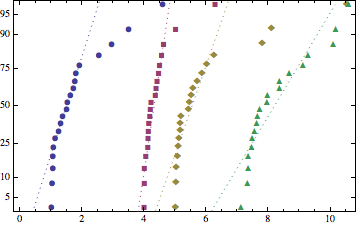We'll look into this. One workaround is to apply the markers to the plot, yourself.
First, get a list of all the standard plot markers:
{glen, glyphs} = {Length@#, #}& @
Cases[
Normal@ListPlot[ConstantArray[{1}, 50], PlotMarkers -> Automatic],
Inset[glyph_, ___] :> glyph,
Infinity] // DeleteDuplicates
Then, perform the replacement:
Module[{i = 0},
Normal[ProbabilityScalePlot[ReleaseHold /@ {data[[#]] & /@ Range[Length@data]}, "Normal"]] /.
{_Hue, col_RGBColor, p_Point} :>
Module[{glyph = glyphs[[Mod[++i, glen, 1]]]}, {col, Inset[glyph, #] & /@ p[[1]]}]
]
